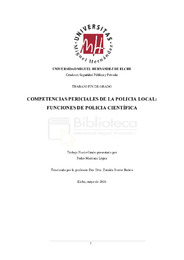Please use this identifier to cite or link to this item:
https://hdl.handle.net/11000/33556Full metadata record
| DC Field | Value | Language |
|---|---|---|
| dc.contributor.advisor | Esteve Bañón, Zoraida | - |
| dc.contributor.author | Martínez López, Pedro | - |
| dc.contributor.other | Departamentos de la UMH::Ciencia Jurídica | es_ES |
| dc.date.accessioned | 2024-10-18T11:25:23Z | - |
| dc.date.available | 2024-10-18T11:25:23Z | - |
| dc.date.created | 2024-06 | - |
| dc.identifier.uri | https://hdl.handle.net/11000/33556 | - |
| dc.description.abstract | En la práctica, la policía local viene realizando funciones que perfectamente se podrían encuadrar en la categoría de Policía Científica, ya que su cometido no es otro que el esclarecimiento de un delito, así como la identificación de sus posibles responsables. A pesar de ello, dichas diligencias tienen el valor de una denuncia Así, tras proceder al análisis de la policía local y del atestado policial, se ha centrado la investigación en estudiar las funciones que la policía local desarrolla como “policía científica”. Tras ello, se ha concluido que se considera necesaria una reforma legal en la que se produzca un reconocimiento a su labor como policía científica en aquellas actuaciones en las que actúen como tal y, en aquellos municipios en los que sea posible, crear unidades especializadas. Para esta cuestión, resulta necesario que los agentes cuenten con la formación necesaria y que cuenten con las acreditaciones de calidad exigibles. Si se dan estas circunstancias, podría considerarse el atestado policial como prueba documental y asimilar su valor probatorio al del informe pericial. | es_ES |
| dc.description.abstract | In practice, the local police have been carrying out functions that could perfectly fit into the category of Scientific Police, since their task is none other than the clarification of facts that have the characteristics of a crime, as well as the identification of their possible consequences. responsible. Despite this, these proceedings have the value of a complaint. Thus, after analyzing the local police and the police report, the investigation has focused on studying the functions that the local police perform as “scientific police.” After this, it has been concluded that a legal reform is considered necessary in which there is recognition of their work as scientific police in those actions in which they act as such. And, in those municipalities where it is possible, create specialized units. For this issue, it is necessary that agents have the necessary training and have the required quality accreditations. If these circumstances occur, the police report could be considered as documentary evidence and its probative value assimilated to that of the expert report. | es_ES |
| dc.format | application/pdf | es_ES |
| dc.format.extent | 66 | es_ES |
| dc.language.iso | spa | es_ES |
| dc.publisher | Universidad Miguel Hernández de Elche | es_ES |
| dc.rights | info:eu-repo/semantics/openAccess | es_ES |
| dc.rights | Attribution-NonCommercial-NoDerivatives 4.0 Internacional | * |
| dc.rights.uri | http://creativecommons.org/licenses/by-nc-nd/4.0/ | * |
| dc.subject | Policía Local | es_ES |
| dc.subject | Policía Científica | es_ES |
| dc.subject | Informe Pericial | es_ES |
| dc.subject | Atestado Policial | es_ES |
| dc.subject | Valor Probatorio | es_ES |
| dc.subject | Local Police | es_ES |
| dc.subject | Scientific Police | es_ES |
| dc.subject | Expert Report | es_ES |
| dc.subject | Police Report | es_ES |
| dc.subject | Probative Value | es_ES |
| dc.subject.other | CDU::3 - Ciencias sociales | es_ES |
| dc.title | Competencias periciales de la policía local: funciones de policía científica | es_ES |
| dc.type | info:eu-repo/semantics/bachelorThesis | es_ES |

View/Open:
TFG-Martínez López, Pedro.pdf
1,16 MB
Adobe PDF
Share:
.png)
